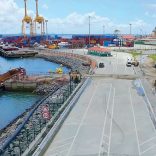Mozambique: Private security companies owe 123 million meticais to INSS
Mozambique: Economic growth set to slow to 4.7% in 2025 – govt

File photo: Lusa
The Mozambican government predicts a “slowdown” in the country’s economic growth to 4.7% in 2025, compared to the 5.5% expected for this year, according to the Medium-Term Fiscal Scenario (CFMP) approved by the executive.
According to the document outlining the 2025-2027 strategy approved by the council of ministers this month, to which Lusa had access on Monday, the government foresees, based on current projections, “moderate growth” in gross domestic product (GDP), “driven by both domestic and external demand”.
The CFMP predicts that Mozambican GDP will increase from 1.322 billion meticais (€18,982 million) in 2023 to 1.536 billion meticais (€21,902 million) this year, growing to 1.637 billion meticais (€23,362 million) in 2025.
“The outlook is positive, with expected growth of 5.5% for 2024 compared to 2023, which recorded growth of 5.0%. A slowdown to 4.7% is expected for 2025, influenced by an expected reduction in the extractive sector due to reaching maximum production capacity, and also in the agricultural and transport and communications sectors, due to climate effects that affect their performance,” the document reads.
The government forecast for 2026 is for real GDP growth of 4.5%, potentially rising to 5.8% in 2027, driven by natural gas production projects.
The document also forecasts “that inflation will remain within the 4.5-5.5% band between 2025 and 2027”, thus “in line with the objective of maintaining inflation in single digits, although subject to pressure from supply shocks and increases in commodity prices, especially food and energy”.
The Medium-Term Fiscal Scenario was prepared with the objective of “translating strategic development objectives into realistic and sustainable financial projections”, thereby providing “a solid basis for decision-making and the efficient allocation of resources”.
“By projecting public revenues and expenditures for the next three years, financial challenges and investment opportunities can be identified that will help guide effective policies and the efficient allocation of resources,” the document states.













Leave a Reply
Be the First to Comment!
You must be logged in to post a comment.
You must be logged in to post a comment.